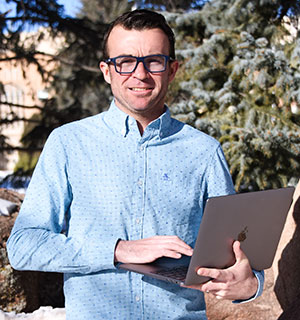UWs Zachary Lebo Receives American Meteorological Societys Early Career Award
Published June 01, 2021

No one could blame Zachary Lebo if he has his head in the clouds.
Lebo, an assistant professor in the University of Wyoming’s Department of Atmospheric Science, was recognized by the American Meteorological Society (AMS) with its Scientific and Technological Activities Commission (STAC) Early Career Award. The honor is for significant contributions to the understanding of and ability to model cloud microphysical processes and the effects of aerosols on clouds, deep convection and precipitation processes.
The AMS is the premier scientific and professional organization in the United States that promotes and disseminates information about the atmospheric, oceanic and hydrologic sciences.
“I am truly honored to be recognized by my colleagues and peers through this early career award,” Lebo says. “It demonstrates the appreciation for my research by others in the field.”
His research has helped bridge the gap between cloud physics -- very small-scale processes such as the growth of individual cloud drops or snowflakes -- and mesoscale processes -- events occurring on the scale of thunderstorms -- through the use of high-resolution numerical models and the development of new, detailed cloud microphysics parameterizations.
“By bridging these scales and applying new modeling techniques, my research has enabled a deeper understanding of how cloud microphysical processes affect the structure of clouds, in particular, convective clouds like thunderstorms. I also have contributed to the reverse effect, namely the influence of the environment and convection in the Earth’s atmosphere on clouds themselves and the resulting precipitation,” says Lebo, who chairs the STAC’s Committee on Cloud Physics.
Lebo joined UW’s Department of Atmospheric Science in fall 2015. His areas of expertise are cloud microphysics and dynamics, mesoscale dynamics and numerical modeling.
Besides his research on cloud models, Lebo also has advanced understanding of the aerosol-cloud-precipitation system in the context of deep convective clouds, and he has suggested new pathways by which cloud microphysical characteristics may change under different aerosol conditions.
“A hot topic in the field currently is the effects of changes in aerosols, which are tiny particles all around us that act as nuclei for the condensation of water in the Earth’s atmosphere and on clouds,” he says. “My research has made significant contributions to this topic through uncovering new mechanisms for how aerosols may influence these clouds and quantifying the impact, especially relative to how small changes in the environmental conditions can affect these convective clouds.”
Another line of important research Lebo has focused on is the growth and demise of hail, which has received increased attention in recent years, owing to the immense economic losses annually. Through several studies, he and his research team have identified factors that cause storms to produce small accumulating hail versus large hail, as well as the influence of melting hailstones on precipitation and the structure of thunderstorms.
Lebo received his Ph.D. in environmental science and engineering from the California Institute of Technology; his master’s degree in meteorology; and bachelor’s degrees in meteorology and mathematics, all from Pennsylvania State University. He conducted postdoctoral work at the National Center for Atmospheric Research.
The award, a certificate, will be formally presented at the 19th Conference on Mesoscale Processes, which will take place at the 102nd AMS Annual Meeting in Houston, Texas, in January 2022.

